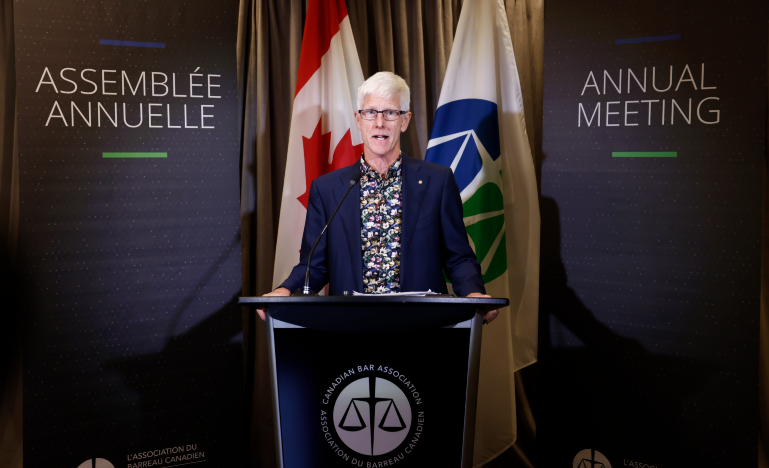Be it resolved
An overview of the resolutions debated and voted on at the 2024 CBA Annual General Meeting.

Policy Committee Chair Tom Ullyett presided over a debate on 13 resolutions at this year’s AGM.
Resolution 24-04-A calls on the CBA to take several measures to confront systemic discrimination, harassment and violence against 2STNBGD+ people. Failure to address these issues can have devastating consequences by continuing to destroy the lives of 2SLGBTQI+ people. Discrimination and violence undermine the rule of law, devalue the human rights of all people, and inhibit economic development and the full contribution of all members of society. The resolution, which was adopted, also urges the CBA to implement the recommendations from its Access to Justice for Trans People.
Another resolution wants the CBA to condemn the use of the notwithstanding clause to enforce policies that force teachers to inform parents if a child wishes to be referred to by a different name or pronouns. It also calls on the CBA to advocate for the repeal of federal, provincial and territorial policies that deny appropriate protections, safety and dignity for two-spirit, transgender, non-binary and gender diverse children and youth, including policies that mandate disclosure of identities or exploration without the student’s consent. This resolution was adopted.
Resolution 24-09-A urges the CBA to oppose any efforts to restrict abortion rights and access in Canada and commit to working with governments and other stakeholders to expand abortion access across Canada. This is necessary because despite existing legal protections for abortion care, members of marginalized communities face disproportionate barriers to abortion access. It was adopted.
Resolution 24-13-A asks the CBA to withdraw previous statements in support of making medical assistance in dying (MAiD) available to people whose sole underlying medical condition is a mental illness. The resolution says extending MAiD to persons whose sole underlying medical condition is a psychiatric condition would have a disproportionate, gendered impact and risks violating s. 15 of the Charter. In addition, the resolution asks the CBA to urge all levels of government to make mental health support accessible, including with proper funding. It was defeated.
Assembled CBA members adopted Resolution 24-07-A, affirming and protecting the right not to be denied reasonable bail without just cause as enshrined in section 11(e) of the Charter of Rights and Freedoms. The resolution also challenges a public narrative that has emerged regarding bail in Canada that perpetuates the misconception of a “revolving door” system that is not accurate.
An alarming increase in violence against older people in the last decade inspired a resolution proposing to amend the Criminal Code to deal with elder abuse and urging the federal government to enact legislation addressing gaps in the Criminal Code when it comes to matters such as social isolation and institutional neglect. This resolution was adopted.
The first of three immigration-related resolutions addresses the staggering backlog of over two million immigration applications, as reported by the Auditor General. Much of this backlog is due to the rise in Access to Information requests to seek reasons for immigration decisions and judicial review applications. The resolution, which was adopted, argues for reducing the backlog by following transparency and public accountability measures at Immigration, Refugees, and Citizenship Canada (IRCC).
The second immigration resolution urges the Minister of Immigration to conduct a complete review of programs leading to permanent residence. It highlights the mismatch between the yearly target for new permanent residents and the number of individuals entering Canada with temporary status. It also emphasizes the vulnerability of racialized and vulnerable individuals within these programs. It was adopted.
The last of the immigration resolutions addresses the growing use of artificial intelligence in Canadian citizenship, immigration and refugee matters. This raises concerns about transparency, deepfake possibilities and bias. The resolution, as adopted at the AGM, urges IRCC to adopt definitions and principles outlined in the Council of Europe Draft [Framework] Convention on AI.
A resolution urging the federal government to eliminate residency requirements for judges sitting on the Federal Court, the Tax Court and the Federal Court of Appeal was adopted. This will invite a wider and more diverse pool of applicants who have the specializations to be judges of these courts but do not wish to reside in the National Capital region to consider applying.
Three resolutions concern bylaw amendments. The first focuses on the composition of the CBA’s Board of Directors and proposes changes to foster increased representation and inclusivity within the association. It was adopted. Each Branch and the CCCA will have the authority to appoint a representative on the Board. The Young Lawyers Section and the National Sections will also name a representative. This will strengthen the CBA’s ability to make informed decisions that benefit all members. As well, it will highlight the value of attracting Indigenous lawyers and lawyers with lived experience as members of equity-deserving communities to CBA leadership roles, as two new Board positions will be created, both to align the CBA’s ongoing efforts toward reconciliation and to reflect the diversity of the legal profession.
The second bylaw resolution that was adopted will amend subsection 46(3), addressing the conditions in place so a Branch can incorporate, to reflect the evolving landscape of not-for-profit corporation laws, in particular the Ontario Not-for-Profit Corporations Act and the powers and responsibilities it gives “members” of a corporation to elect the Board of Directors. This will give more flexibility for Branch elections under modern not-for-profit rules while maintaining safeguards to ensure the Branch meets its other terms and conditions.
The third bylaw resolution, which was also adopted, will replace all references to “equality” in the bylaw with the term “equity.” The resolution also recognizes that the expression “equity-deserving” is intended to reflect that all individuals and groups are deserving of equity, and the term “equality-seeking” suggests individuals and groups are responsible for actively seeking equity or equality. A definition of the term equity will be added to clarify the CBA’s mandate and programs by affirming its commitment to supporting historically disadvantaged individuals and communities. The definition says equity is “the ongoing process of identifying and overcoming barriers to achieve equal outcomes in the legal system and full participation in the legal community, which requires focusing on inclusion, diversity and accessibility.”


